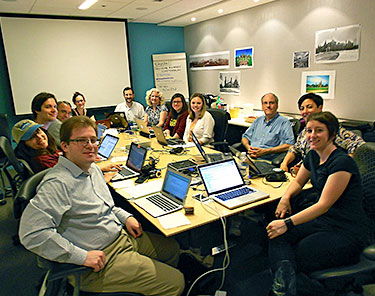
The Smithsonian benefits from the work of thousands of passionate volunteers who support the organization on-site in our museums, zoo, and other facilities.
Today, digital technology makes it possible for people who believe in the Smithsonian mission to make significant contributions online. "Digital Volunteers" can now take on important assignments to expand access to the Smithsonian's massive collections, and can participate in a variety of research programs. Some roles require special knowledge or skill, but many do not.
Selected opportunities are described below.
Smithsonian Transcription Center
Launched in July 2013, the Smithsonian Transcription Center seeks to engage the public in making our collections more accessible. Citizen scholars are invited to transcribe historic documents including diaries and working papers of prominent Americans and records associated with the Smithsonian's vast scientific collections. Transcription makes these important materials more accessible to researchers around the world, as well as the general public.
To date, more than ten thousand citizen scholars have come to the Transcription Center and engaged with the wide array of documents posted there by Smithsonian archivists and curators—from field notebooks surveying snakes and reptiles in South Dakota in 1894 to the diaries of Leo Baekeland, the American chemist and founder of the modern plastics industry.
To learn more about this opportunity and get involved as a citizen scholar, visit the Smithsonian Transcription Center.
Archives of American Gardens: Help us solve a mystery
Do you love gardens and the thrill of the hunt? The Smithsonian’s Archives of American Gardens has images of numerous gardens across the United States that need a bit of sleuthing to be positively identified.Some images belonged to slide lectures that were dismantled over time or simply never were labeled. Regardless of how it happened, they are a mystery!
To learn more about this opportunity and get involved, visit the Archives of American Gardens Mystery Project.
Encyclopedia of Life (EOL)
Our knowledge of the many life-forms on Earth - of animals, plants, fungi, protists and bacteria - is scattered around the world in books, journals, databases, websites, specimen collections, and in the minds of people everywhere. Imagine what it would mean if this information could be gathered together and made available to everyone – anywhere – at a moment’s notice. This dream is becoming a reality through the Encyclopedia of Life.
To learn more about this opportunity and get involved, visit the Encyclopedia of Life Translation Project.
Invader ID
If you’ve ever looked underneath a dock, you’ve probably noticed that it is covered with living things! This group of organisms, known as a fouling community, contains a wide variety of invertebrate animals, algae, and bacteria. Through Invader ID, you can help us to track changes in fouling communities and look for new occurrences of invasive species. With your help, we’ll be able to track fouling communities in more places, and hopefully see early warning signs of environmental changes.
To learn more about this opportunity and get involved, visit the Invader ID Project on Zooniverse.
Smithsonian Wikipedian Volunteer Program
The Smithsonian seeks digital volunteers to assist in contributing content to Wikipedia related to our collections and areas of expertise. Improving the quality and quantity of reliable information on Wikipedia, as well as usage of Smithsonian resources on the site, helps meet our mission, the "increase and diffusion of knowledge." We seek experienced and motivated Wikipedia editors who are technically proficient in both the software and the norms of the Wikimedia community. To find out more about how to become a Wikipedia volunteer for the Smithsonian, visit the Smithsonian Institution's WikiProject.